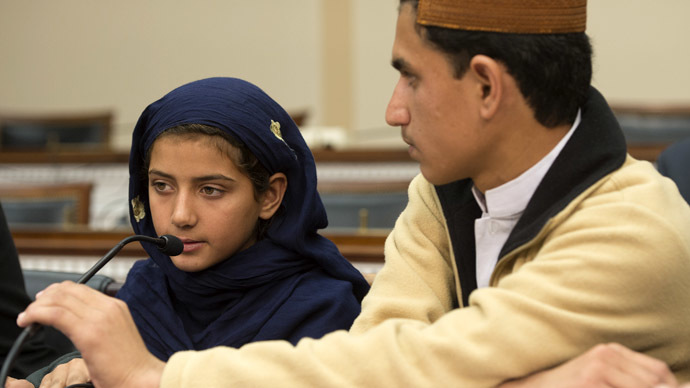‘Putting a human face’ on the problem of US drone strikes

Approval of drones by Americans would reduce greatly if people know that innocent civilians are being killed during unmanned strikes, believes Jennifer Gibson, US advocate for the Pakistani family which suffered from the US drone strike.
While the UN claims there have been about 400 civilian victims of American drones in Pakistan, Afghanistan and Yemen in total since 2008, other estimates put that number as high as 900 (Bureau of Investigative Journalism) or even higher, around 3,595 casualties since the drone strikes began.
Whereas the Pakistani defense Ministry has just come out with a shockingly small number of only 67 civilian casualties in drone attacks.
Yet every casualty has a face and a family that mourns its dead. One such Pakistani family has come to the US to face Congress and tell their story.
Rafik Rahim and his children Zubair, 13, and Nbila, 9, who lost their grandmother when she was killed by a drone attack while working in her vegetable garden.
Zubair told RT’s Breaking the Set program that he was walking towards his grandmother when he saw a drone fire two missiles. The resulting explosions killed his grandmother and left him unconscious, with a wounded leg. The same drone made a second attack, injuring more members of their family.
Since that incident, Zubair said he is “living in constant fear” that something similar could happen again.
‘I’ve never done wrong to anyone, so why did I get hurt?’
Rafik Rahim, who lost his mother, says that on that day he was away from the village buying sweets and gifts for a feast on the following day. When he returned, he saw funeral service preparations and asked who had died. When he learnt that it was his mother, he fainted, dropping everything he had bought on the road.
“I’ve never been in a situation like that and I felt as if a limb was cut from my body,” he said.
Rafik’s message when he spoke to the American Congress was that he just wanted them to be aware that something bad is happening in Pakistan.
“We’re innocent people. I’m just a teacher. I’ve never done anything wrong and my children don’t mean any harm to anyone, neither did my mother,” he said.
He shared his dream with the Congress that drone warfare would cease and they can live peacefully.
He expressed the fear that in the current situation his children will have difficulty finishing their education because they are scared of leaving the house after the incident.
“Ever since the death of my mother, we all live life where everything is upside down,” Rafik shared, stressing that he disagrees the drones help in the fight against terrorism and that they bring constant fear to ordinary people.
Being in the country responsible for his grandmother’s death, Zubair feels no hatred towards Americans because he realizes that in every country, “just like in Pakistan”, there are good and bad people.
He pointed out that American President Barack Obama is saying that drones are necessary to fight terrorists, who are definitely bad people.
“But I’m not a terrorist, so that’s why I came here, to tell my story. I’ve never done wrong to anyone, so why did I get hurt?” Zubair questioned.
The Pakistani authorities told Rafik they have nothing to do with
drone strikes and redirected him to the Americans.
“That’s why I’m here seeking answers,” he said.
‘We need transparency in the drone program’
Jennifer Gibson, family’s advocate in the US, revealed to RT that
previous the advocate working on the case, Shazar Akhbar, was
denied an American visa despite the fact that he has previously
been granted one many times.
But once he took up the drone case, his visa was denied,
permanently.
The obvious conclusion is that the US State Department does not want him to come to the US and speak about the case, Gibson said.
“He is a critical voice in this debate… needed to get to the bottom of the impact of what is going on (in Pakistan),” said the American lawyer.
In the meantime only five members of Congress turned up at the
hearing where Rahim’s family spoke out.
Furthermore, it took a whole six months to arrange documents to bring the Pakistani family to the US.
At the same time Gibson expressed surprised that even five Congressmen showed up, some of them influential members of various commissions of the House of Representatives, adding that just a year ago none of them would have attended such a hearing.
Considering the fact that only 26 percent of Americans disapprove of drone strikes, the lawyer hopes “to put a human face” on the problem to inspire Americans to speak out against drones.
Jennifer Gibson acknowledged that approval of drones would reduce greatly if people knew that innocent civilians are being killed during unmanned strikes.
“Here are three civilians impacted by the US drones strikes,” she claimed. “They need answers - we need transparency in the (drone) program.”
“Maybe if we start putting faces to the numbers, engaging with a human side of this discussion rather than just statistics, we can get people to take action,” the lawyer said.
“We’re all human beings and by me coming to share my story with other human beings having natural feelings, they will sympathize and realize that we’re innocent people,” Rafik explained. “We’ve done nothing wrong,” he said.
Those Americans who heard his story could help their case by putting pressure on politicians at home to stop drone strikes.
“Please find a way to end these drones,” Zubair said,
adding that he constantly hears drones over his head, and can’t
communicate or play with his friends in a normal way because he
fears that one day he is going to end up like his grandmother.
The statements, views and opinions expressed in this column are solely those of the author and do not necessarily represent those of RT.












